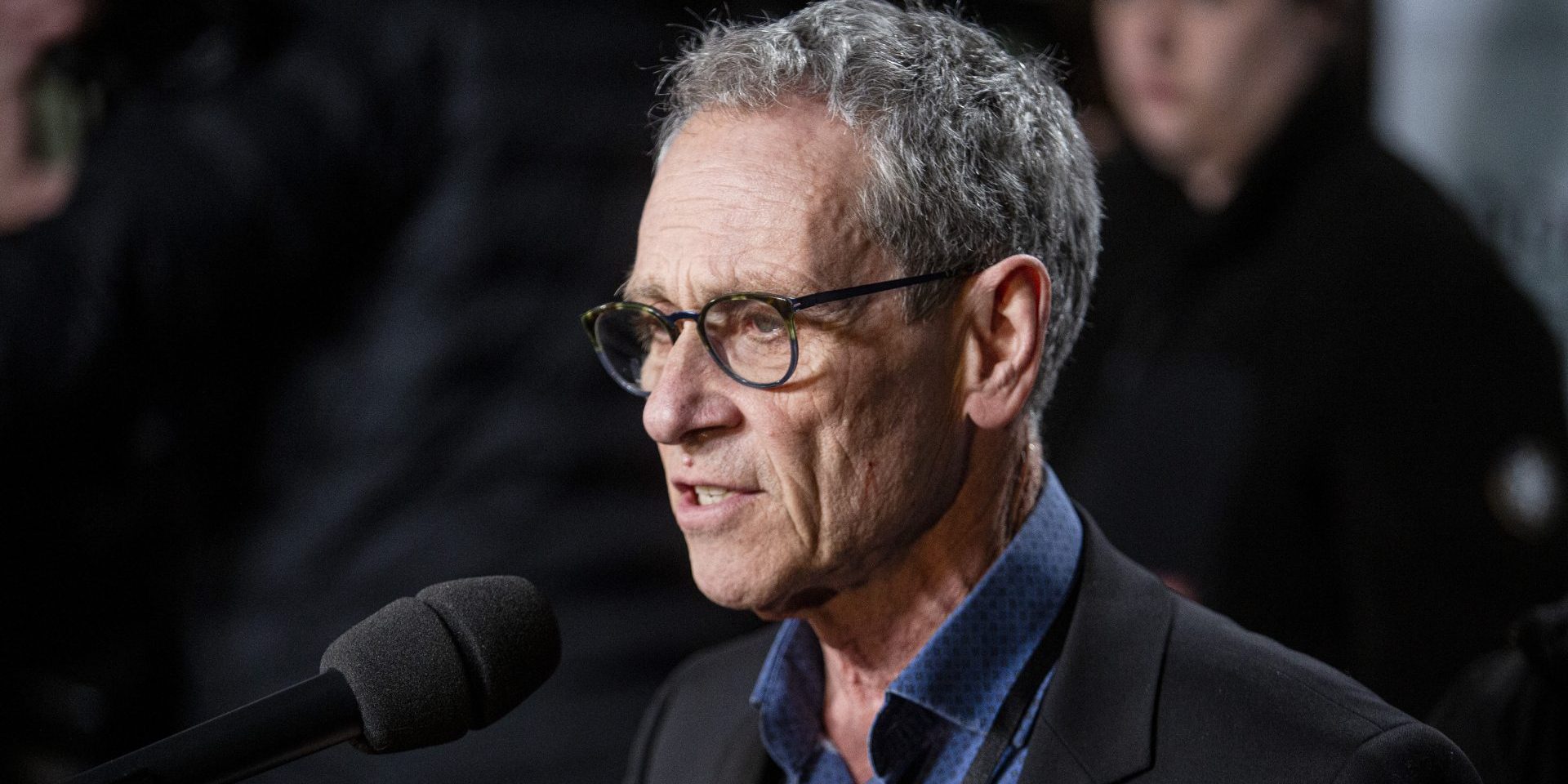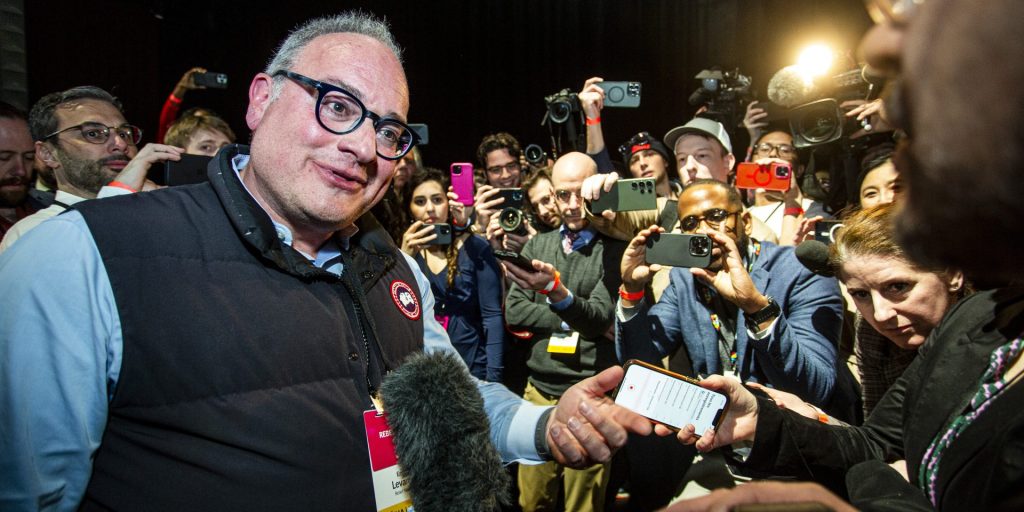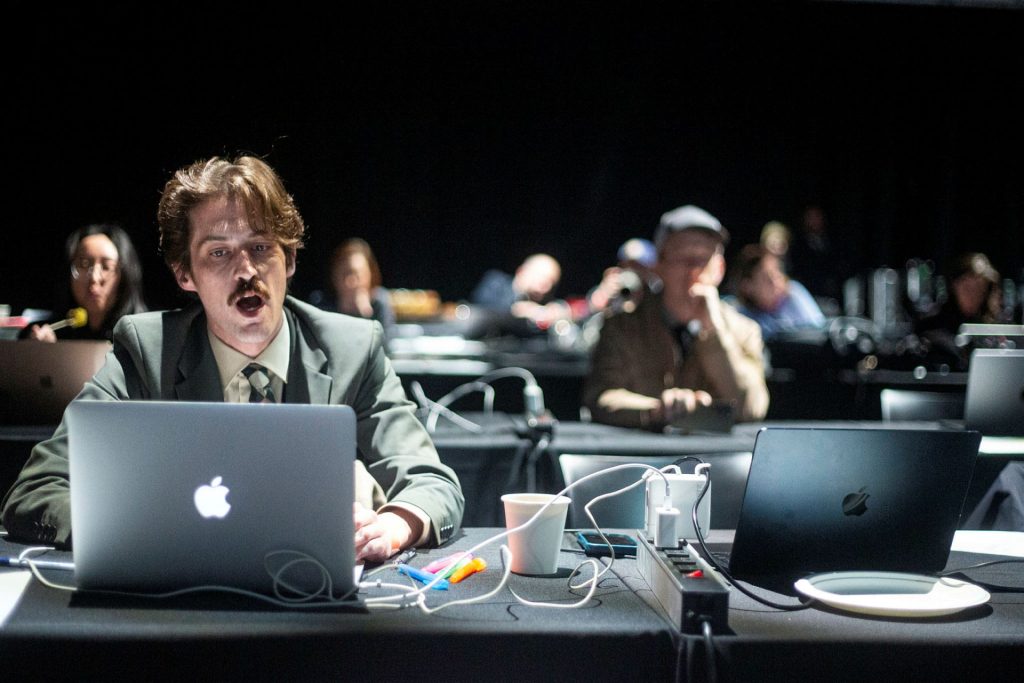Leaders’ Debates Commission’s future queried after Montreal scrum cancelled

The accreditation of right-wing outlets and registered third-party organizations at the 2025 election’s leaders’ debates, as well as the subsequent cancellation of post-event scrums, has led some in the media industry to question the future of the Leaders’ Debates Commission.
“What we’ve learned is that the current structure is no longer tenable and that ultimately we’re going to have to do some serious soul searching to figure out how we can ensure that journalists are the ones participating in journalistic spaces, and how we keep those spaces safe so that journalists can go about doing their jobs and holding powerful people to account, like politicians,” said Brent Jolly, president of the Canadian Association of Journalists.
Normally, what is said at the leaders’ debates makes for memorable takeaways. But this year, it was what happened before and after the debates held at Maison de Radio-Canada in Montreal, Que., that made headlines.
It began with the scrums following the French-language leaders’ debate on April 16 when representatives of Rebel News and other right-wing media outlets dominated the question-and-answer session. NDP Leader Jagmeet Singh refused to answer any questions from Rebel News because he said it “promotes disinformation.”
Founded 10 years ago by owner and CEO Ezra Levant, Rebel News said that it was able to secure accreditation for 16 of its employees; four got to ask questions, along with representatives from fellow right-wing media sites Juno News and True North Wire Service.

Mainstream media were also at the post-French debate leaders’ scrums and got to ask about half the number of questions, with other non-traditional outlets posing the remainder, such as one by True North, whose representative asked Liberal Leader Mark Carney, “how many genders are there?” The Liberal leader replied that “in terms of sex, there are two.”
Jolly said he met with commission executive director Michel Cormier last week about how “Rebel News representatives dominated” the post-French debate pressers. He said the commission is re-examining its role going forward and is expected to issue a report this fall.
The commission told The Hill Times that it “is doing an assessment of its federal election experience for its final report and will not be commenting publicly at this time.”
Cormier said on CBC News the following day that he “wasn’t aware” that Rebel News Network Ltd. had registered with Elections Canada as a third-party advocacy group.
ForCanada, which Levant established this year and which was also listed as a third party, states on its website that it “operates independently” of Rebel News for which he serves as publisher. ForCanada’s mission is “to take on Mark Carney and the establishment forces trying to reshape Canada in their globalist vision. We’re here to hold them accountable and give Canadians the full story—something the mainstream media won’t do.”
The organization, which was able to raise and spend up to $600,000 during the election campaign, drove a rented billboard truck with messages suggesting that Carney is a World Economic Forum “puppet,” and which appeared at the debates in Montreal.
In January, the Federal Court of Appeal upheld two $1,500 fines that the Deputy Commissioner of Canada Elections imposed on Rebel News in 2021 for distributing anti-Liberal Party signs during the 2019 federal election without, in part, registering as a third-party. The court rejected Levant’s argument that the signs were to promote his 2019 book, The Libranos: What the Media Won’t Tell You about Justin Trudeau’s Corruption.
Rebel News was successful in the Federal Court when, during the 2019 federal election campaign, it granted the organization and the True North Centre for Public Policy access to the leaders’ debates after being denied access by the commission. Rebel News followed the same path to gain accreditation to the 2021 election leaders’ debates.
The day after this year’s French-language leaders’ debate, Cormier told CBC’s Power & Politics host David Cochrane that the commission could not win another legal challenge against Rebel News based on previous rulings.
“We’re under court orders and precedents to accredit their journalists,” Cormier told The Globe and Mail and noted that “for the purposes of the accreditation, the only thing that we required is that the media organization either produces news content related to coverage of Canadian and or international political news, or covers political, social and policy news.”
According to Cochrane, not long after, on the day of the English-language leaders’ debate, Levant showed up at the Power & Politics set wanting to appear on the show.
Cochrane posted on X, “we were playing a 60-second report when Ezra accosted me. He wouldn’t stop,” said Cochrane.
“So, the control room in Ottawa kept playing tape to prevent the incident from being carried live on air. The debate commission wouldn’t take action because ‘We were in commercial’ (we weren’t).”
“So, this was allowed to continue. We had to scramble to cover the incident by playing tap[e] until it was over. No proper professional journalist intentionally interrupts the [broadcast] or work of another professional journalist.”
The Hill Times reached out to Cochrane for further comment, but was referred to a CBC spokesperson.
Chuck Thompson, head of public affairs at CBC, said in an interview that the clip was aired to give the crew time to set up a microphone for Rosemary Barton, the public broadcaster’s chief political correspondent, before she came on Power & Politics.
“When Levant interrupted, they had to scramble the lineup of the show, and that in turn disrupted Rosie’s appearance,” said Thompson.
“These were journalists doing their jobs on live television, and Ezra Levant interrupted that in a highly inappropriate manner.”
Thompson said that “what happened was very unsettling” for Cochrane and Barton.
“We will be addressing what we do going forward to ensure that kind of unwelcome intrusion does not happen again,” he said, adding that as part of its “post-mortem” CBC will look at “all aspects of how our hosts and crew can feel secure and comfortable wherever they’re broadcasting from.”
On X, Levant said that CBC complained to the debates commission “and asked them to revoke my credentials, but the commission declined.” Said Levant on X: “The CBC lied about Rebel News for hours. And when I went to ask for the right to reply, they refused and lied about me more. Their lies were so bad even the debates commission didn’t believe them.”
Thompson said the network “didn’t file an official complaint” with the commission, but “we did express our very real concerns about another possible interruption during The National given what had transpired earlier on the set of Power & Politics.”
Levant did not respond to a request for comment from The Hill Times.
The alleged incident led to others that made Levant the focal point of an evening where the main political leaders were meant to be in the spotlight, both during the debate and afterward when accredited reporters could ask the leaders questions. But those scrums were cancelled.
Cormier told reporters after the English debate on April 17 that there were would be no Q-and-As with the leaders “because we don’t feel that we can actually guarantee a proper environment for this activity.”
However, later that evening, Mercedes Stephenson, Global News’ Ottawa bureau chief and the host of the network’s flagship national public-affairs program, The West Block, posted on X that “a source with direct knowledge” said the commission’s decision to cancel the scrums “was related to The Rebel…including Rebel staff trying to interrupt/get on the air during a CBC broadcast that was live earlier tonight.”
Inside the media room, Ethan Cox, the Montreal-based senior editor and co-founder of Ricochet Media, squared off with Levant and said he held him “100 per cent” accountable for having the scrums shut down.
Cox told The Hill Times that accredited journalists were not allowed to enter the Radio-Canada building before the debate began because of “a security incident,” and said he believes it involved the Levant-CBC matter.
Cormier did not respond to a request for comment, but the commission told The Hill Times in an email that it was assessing the entire experience for its final report.
In an interview, Cox said “it seems as if they have as many news outlets as they can create websites. They just fundamentally game the system and the debates commission was woefully ill-equipped to handle a full-on assault.”
Juno News was founded this year by Candice Malcolm and Keean Bexte. According to its website, it publishes content from True North, which Malcolm founded in 2016.

According to Cox, “Ezra Levant was directly responsible for the fact that journalists were not allowed to ask questions on behalf of the public at the conclusion of the only English leaders’ debate in the campaign and that is a fundamental affront to democracy.”
“It’s one thing to ignore the circus that Ezra Levant tours around so that he can raise money off of it,” said Cox. “But it’s another thing entirely when that circus starts to interfere—not just with journalists’ ability to do their jobs, but with the public’s ability to follow the election campaign.”
Cox said that for the post-debate scrums, the commission was “bullied into breaking its own rule that one person per outlet can ask a question, and Rebel threatened to sue and the debates commission folded like a cheap suit.”
Cox said that as part of its due diligence regarding Rebel News, the commission should have noted that Levant’s operation is not designated as a qualified Canadian journalism organization (QCJO) by the Canada Revenue Agency (CRA) to claim a journalism labour tax credit. Rebel News applied for the QCJO status in 2021, but was rejected by the CRA on the basis that no more than two per cent of its content was original news—a decision upheld by the Federal Court last year.
“Ezra’s all about not taking government money,” said Cox. “But he literally went to court to access journalism tax credits, which the last time I checked, is government money.”
In her capacity as editor-in-chief of Rebel News, Independent Press Gallery president Sheila Gunn Reid released a letter to Cormier—misidentified as the debates commissioner—in which she said that “Rebel News journalists were subjected to ongoing, organized harassment by fellow members of the accredited press corps—most notably Ethan Cox of Ricochet Media and Stuart Benson of The Hill Times—who taunted, heckled and hurled vulgarities at our team when we attempted to do our jobs.”
Cox said that is “nonsense,” and said that he only talked with Levant after the English debate.
As with Cox, The Hill Times reporter Benson was videotaped when he argued with Bexte over an April 15 Juno News story Bexte wrote about alleged homophobic slurs uttered by a Liberal candidate.
“My first mistake was engaging with him at all, and then giving him something to record,” said Benson, who also got into a heated back-and-forth with Levant over his third-party role in the election and was later told by a commission employee to lower his voice.
Benson said that although he regretted drawing attention to himself in the media room, he felt as if he said “what other fine reporters weren’t able to say, but were all thinking.”
For its part, the Green Party of Canada—which was disinvited from the debates on the morning of the French-language one over the commission’s determination that the party failed to meet criteria the commission previously said the Greens had met—wondered on social media why it was “being silenced” by the debates commission “while Rebel News and True North [got] press credentials. Something doesn’t add up.”
Green Party Co-Leader Elizabeth May, who is running for re-election in Saanich—Gulf Islands, B.C., said that “at every stage in this election year, this debates commission, created to protect democracy and improve voter information, has done exactly the opposite. The way they treated the Green Party, and accepted Rebel News and True North as if they are journalists and gave them media credentials.”
The debates commission was established by then-prime minister Justin Trudeau’s government in 2018. The only person to fill that role was former governor general David Johnston, who resigned in 2023 when he was named special rapporteur investigating foreign interference during the 2019 and 2021 federal elections. He was unavailable for comment.
May also wants Cormier and his staff to resign.
The Hill Times





 LICENSING
LICENSING PODCAST
PODCAST ALERTS
ALERTS













